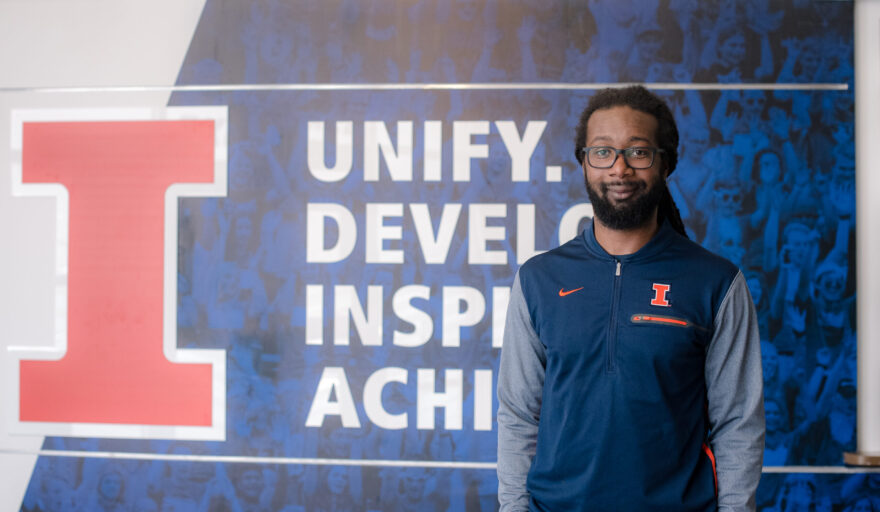Breaking New Ground: D.J. Taylor’s Role Merging Social Work and Collegiate Athletics

Fostering Positive Change
D.J. Taylor’s path to pursuing a Master of Social Work (MSW) degree was driven by his own experiences receiving mental health treatment as a student-athlete. “The relatively low amount of representation my demographic has in the field of social work led me to grow a real interest in the field,” he says. “The opportunity to be a part of a profession with a growing need and purpose in a field that I care about was my sign to apply for graduate school and pursue an MSW.”
D.J. is the first Social Work student intern at the University of Illinois Division of Intercollegiate Athletics, a role brimming with potential to foster positive change within the campus athletic community. “I am highly grateful to have been the first to walk in a door that intersects social work and athletics on campus. The role is one I felt was needed in collegiate athletics given the many values that both fields hold in high regard such as service to vulnerable populations and communities,” he says on the topic of his internship. “Given the growth and learning I’ve experienced throughout the iMSW program, one of the challenges I was looking forward to when initially beginning the internship was promoting the destigmatization of mental health within the student-athlete community.
I felt that my position as a former student-athlete at the university combined with the tools I’m developing as a social worker would aid in facilitating such conversations with student-athletes and have been blessed to have been a part of an internship site that was already engaged in promoting such matters.”
As an assistant learning specialist, D.J. works closely with student-athletes who have education-impacting disabilities such as ADHD, dyslexia, or dysgraphia. “We create individualized learning plans for student-athletes who are chosen to be on our learning services caseload and meet with those students anywhere from one to five times per week, assisting them with academic (sometimes behavioral) skill-building throughout the semester,” D.J. offers. “Aside from the work I do with my caseload of students, I’ve also had the opportunity to administer learning assessments using instruments taught to me by clinicians on the site and create assessment reports rooted in psychosocial theory that illustrate a students’ current academic aptitude as well as provide information on their biopsychosocial background.”
Filling A Gap
Social work roles have been notably absent from the sports field, but roles like D.J.’s, offering support have been steadily increasing for student-athletes on campus as well as in the wider sphere. D.J. believes in the impact and importance of offering social work support for athletes. “There aren’t many more diverse communities than in athletics, and with the mesh of so many cultures I think it’s important to instill culturally humble and competent practitioners and support staff in the collegiate sports domain. The impact proper support could have on this stage of these students’ lives could be monumental.
The role of [the] social worker is growing at a steady pace in athletics at all levels currently and for good reason,” he goes on to conclude. “With the quickly evolving and unpredictable landscape of college athletics in its current era, the demand for more professional support for student-athletes socioemotional development will rise and roles such as learning specialists, team clinicians, student-athlete development coordinators, will likely mirror that rise. I encourage any practicing social work student even remotely interested in athletics to explore the possibility. It has been a multi-dimensional experience for me and I’m excited to see what the future holds.”